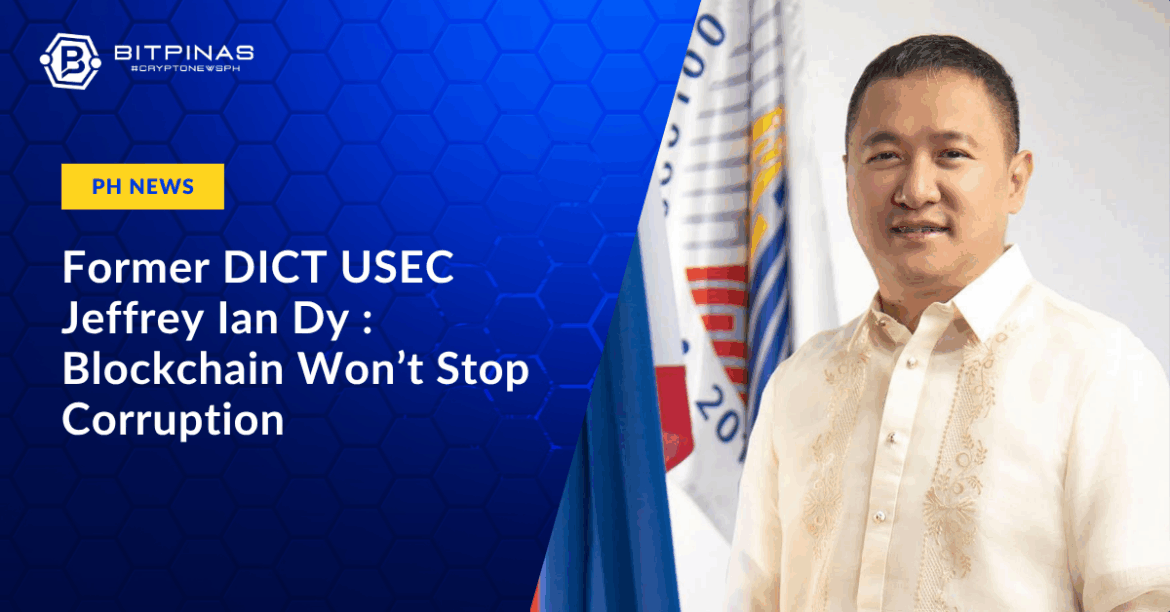Disclaimer: This article is for informational purposes only and does not constitute financial advice. BitPinas has no commercial relationship with any mentioned entity unless otherwise stated.
📬 Get the biggest crypto stories in the Philippines and Southeast Asia every week — subscribe to the BitPinas Newsletter.
The blockchain technology, by itself, will not eliminate corruption in government.
This was what Jeffrey Ian Dy, a former undersecretary of the Department of Information and Communications Technology (DICT), implied with the recent surge of bills filed in the 20th Congress to establish a national blockchain to combat corruption.
Blockchain Alone Won’t Stop Corruption
In a Facebook post on October 4, 2025, the former official argued that while blockchain can make government data immutable and publicly distributed, it would not prevent corruption schemes.
“But blockchain would not prevent [terms of reference] TORs from being written to favor specific vendors. Blockchain would not prevent collusion among vendors and [government] officials.”
Jeffrey Ian Dy, Former Undersecretary, Department of Information and Communications Technology
Dy further said that the proposed measure’s plan to place all government data on the blockchain deviates from the core principles of the technology. Instead, he added, it would likely result in a hybrid system with a reversible document repository, largely relying on proprietary technology from the private sector.
Moreover, Dy noted that current platforms like the Philippine Government Electronic Procurement System and agency transparency websites already provide access to bidding documents and announcements, but corruption remains a challenge.
He also warned of a lack of technical expertise within government agencies to maintain blockchain systems.
“Plus, of course, there is the issue of lack of expertise in government to maintain the tech, resulting in another vendor locking the country to a (possibly) proprietary tech—which is also akin to graft.”
Jeffrey Ian Dy, Former Undersecretary, Department of Information and Communications Technology
In addition, Dy cited the Philippine National Public Key Infrastructure as an example of a government technology that remains underutilized despite its potential.
“This opinion may be unpopular, but it is true. Blockchain is good, but it is the way it will be implemented that matters.”
Jeffrey Ian Dy, Former Undersecretary, Department of Information and Communications Technology
As of writing, 11 blockchain-related measures have been filed in the 20th Congress, focusing on digital assets, government transparency, and budget accountability. Of these, nine are pending in the House of Representatives, while two are lodged in the Senate.
The list includes several key proposals, such as SB 1330: Blockchain the Budget, along with HB 4380, HB 4489, HB 4611, HB 4853, HB 4935, and HB 5041, which all focus on integrating blockchain technology into government budget transparency. Other notable measures are HB 4075: Blockchain Technology for Government Efficiency Act, HB 4792: Philippine Tokenization and Crypto Adoption Act, SB 433: Digital Assets Act, and HB 421: Strategic Bitcoin Reserve Act.
Recently, former Solicitor General Florin Hilbay questioned proposals to put the national budget on a blockchain in his Facebook post, arguing that the move would add unnecessary cost and complexity without ensuring greater transparency.
- He said blockchain has been used more as a marketing term than a genuine technological solution, warning that the proposed system under SBN. 1330 would function as a centralized database rather than a true decentralized ledger.
In addition, Manila Bulletin Columnist Art Samaniego warned that the government’s growing enthusiasm for blockchain could create new risks instead of ensuring transparency, stressing that the technology cannot verify the truth of the data it records.
- He explained that while blockchain can make records permanent and auditable, it also preserves false or fraudulent information, especially if the system is controlled by a single agency or private provider.
- Samaniego then cautioned that without proper verification, independent oversight, and decentralization, blockchain could become a political slogan or tool for illusionary transparency rather than genuine reform.
Moreover, John Clark Naldoza argued that government blockchain transparency initiatives fail to address the real issue of data accuracy, warning that the technology can only preserve, not verify, information.
- He explained that blockchain systems suffer from the “oracle problem,” where false or fraudulent data entered into the chain becomes permanently recorded.
- Naldoza stressed that true accountability requires fixing data quality through audits, verification, and oversight rather than relying on costly blockchain solutions that merely make bad data immutable.
On the other hand, an open letter posted on Facebook of a civilian, Richard Gadin, addressed to the DICT, raised several questions about the government’s blockchain initiative, particularly its partnership with Polygon and BayaniChain.
- Gadin questioned the need to involve private vendors in developing a government blockchain system, suggesting instead the establishment of a state-funded blockchain laboratory and a dedicated national development team composed of Filipino developers.
- His letter proposed that the government build a public, open-source blockchain infrastructure from the ground up, with the entire process made transparent through platforms such as GitHub and social media to ensure public auditability.
- Gadin also cautioned that involving external vendors could lead to perceptions of conflict of interest or commercialization, emphasizing that a government-owned and publicly developed blockchain would help strengthen trust, accountability, and national digital sovereignty.
This article is published on BitPinas: Former DICT USEC: Blockchain Won’t Stop Corruption
What else is happening in Crypto Philippines and beyond?


